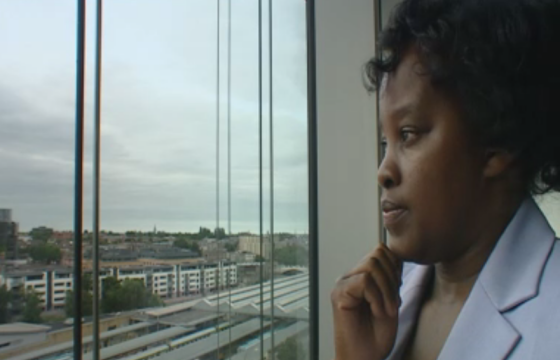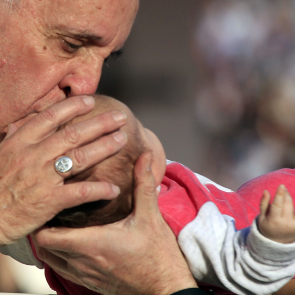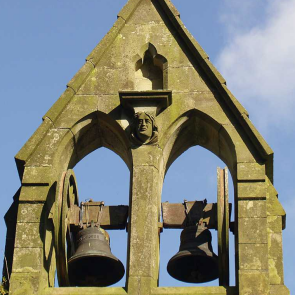That old chestnut is back to haunt RTÉ again. Not some hangover from Halloween or some seasonal bout of conkers but the Angelus, the Irish state broadcaster’s longest-running and most-watched religious programme.
A revamp of the one-minute television spot broadcast daily at 6pm has provoked the ire of those who oppose any “watering down” of this quintessentially Catholic prayer, with some accusing the station of trying to kill off the Angelus once and for all.
Despite the vast shift in Irish viewing habits in recent years, television figures show it has an audience reach of 34.55 per cent on any one day. Yesterday (Tuesday 10 November) it was 416,000 viewers which is more than nearly any other religious broadcast on RTÉ.
The new format involves reflective visuals of people such as a sand sculptor, a baker, a blacksmith, a book binder and a gardener pausing to reflect – accompanied by the chimes of the Angelus bell in the background.
In addition to these films, RTÉ has designated one slot per week as ‘The People’s Angelus slot’.
Yes, gone is the static visual of an icon of the Virgin Mary and the Angel Gabriel of my youth. But it has been gone since the 1990s and anyway, should that really surprise us? Was that creative television? Could that possibly be expected in 21st century Ireland which is an increasingly pluralist and secular republic. This is RTÉ not EWTN!
READ MORE IN THE TABLET NEWSPAPER...
Read full analysis and comment on the responses in this week’s print edition of The Tablet. To subscribe click here
Following the announcement of the new Angelus format, Kerry politician Deputy Michael Healy-Rae TD issued a statement roundly condemning “any change in the way the Angelus is presented”.
Highlighting that the Angelus has been broadcast for decades, he warned that “any watering down of it should not be allowed” and that it should be “retained in its present format”. His views were echoed by religious commentators like David Quinn and Mary O’Regan.
But according to Roger Childs, Senior Production Executive & Genre Head of Religious Programmes at RTÉ, “the only significant change” with the new version is the addition of The People’s Angelus, a showcase for the creative talents of aspiring filmmakers, which features one day a week on a Friday.
He told me that there is “no substantial editorial difference between the current approach and the previous, which ran from 2009 to 2015 and which showed people in a number of walks of contemporary Irish life taking a moment to ‘Go placidly amidst the noise…’.
 An example of the 'new look' Angelus from as far back as 2009 in which a Zambian office worker takes a moment to reflect (PA)
An example of the 'new look' Angelus from as far back as 2009 in which a Zambian office worker takes a moment to reflect (PA)
Prior to that, RTÉ had, for quite a number of years, run short films depicting people apparently experiencing some sort of epiphany. “I wasn’t, personally, a fan of these, because I didn’t think they came across as authentic, although I understood why RTÉ had chosen to move away from the strict Marian iconography that once appeared in these slots,” Childs told The Tablet.
Under the Broadcasting Act (2009), RTÉ has a legal responsibility to reflect the culture of Ireland, including its religious culture and to serve licence payers of all faiths and none, including, Catholics who comprise 84 per cent of the population. The biggest single element of the station’s religious output is Christian worship.
Responding to claims that the Angelus offends Protestants, Roger Childs believes those making the complaints are usually not the Protestants themselves, but secularists making critical assumptions on their behalf.
“In fact, I have had anecdotal support for the continuation of these reflective broadcasts from many Protestants – most recently, last week on BBC Radio Ulster’s Talkback programme, where an East Belfast Presbyterian took issue with a representative of Atheist Ireland for trying to scrap the tradition.”
Not all faiths lend themselves to broadcast worship. In Orthodox Judaism, it is expressly forbidden, because it involves working on the Sabbath; in Islam, Sikhism and Hinduism, it involves broadcasting in Arabic or other sub-continental languages that would exclude mainstream RTÉ audiences.
“If you compare RTÉ’s coverage of Catholic affairs to that of UK broadcasters, including my own former employer, the BBC, you will find we are ahead in both scale and positivity. Perhaps that is partly why our output won the UK’s leading Religious Broadcasting Prize, the Sandford St Martin Award this year,” Roger Childs explained.
MORE NEWS, MORE ANALYSIS IN THE TABLET...
Read full analysis and comment on all the latest stories in this week’s print edition of The Tablet. To subscribe click here
But he is attempting to thread between the Scylla and Charybdis of those who want more ‘orthodox’ Catholic material, seeking an EWTN format from the state broadcaster and the vocal if small secularist lobby who want the Angelus and all religious content scrapped and who have complained that the Angelus gives “an inappropriately privileged position to Catholic ritual for a national broadcaster”.
Formal complaints are currently in preparation by Atheist Ireland which the Broadcasting Authority of Ireland (BAI) will rule on in the future. They are the arbiters.
However, the Broadcasting Authority of Ireland has, on four occasions, declined to uphold complaints of that nature. “If there are ways I can make these reflective slots feel more inclusive, rather than exclusive, I think that is appropriate, given the nature of RTÉ’s funding and cultural responsibilities,” Roger Childs said.
I would suggest that those who jump to criticise RTE over the Angelus might be better advised to inject their energies into supporting religious broadcasting and religious publishing more vocally. Ratings and viewer figures speak. Are they as vocal in supporting RTÉ’s other religious output?
AN EXAMPLE OF THE ANGELUS ON RTE - FIRST AIRED 15 OCTOBER 2015...
Every Sunday, RTÉ broadcasts a Mass or a Service on television and a Mass and a Service on Radio. There is Mass in English and Irish every week on radio, as well as on all major feast days.
That amounts to over 80 hours of live radio broadcasting and over 40 hours of television output per year – which Childs underlines is “an enormous commitment and expense, which RTÉ occasionally has to defend against criticism from those who see Catholic viewers and listeners being super-served, because no other denomination receives anything like that level of religious coverage.”
Besides Christian worship, RTÉ’s output includes documentaries, discussions, magazines, interviews and short reflective programmes. For instance, the documentary series Would You Believe? has, in the last 12 months, featured a documentary about the restoration of St Mel’s Cathedral in Longford, a profile of Pope Francis and a film about a Limerick community staging a Passion play by a Catholic parish.
Currently in production are films about a group of pilgrims walking the Camino de Santiago de Compostella, a landmark documentary about St Columbanus and a film about the national shrine at Knock.
Can this really be considered to be indicative of an organisation that is hostile to Catholicism?
KEEP UP TO DATE ON TWITTER AND FACEBOOK...
Follow all the latest news and events from the Catholic world via The Tablet's Twitter feed @the_tablet
Or you can join in the debate at our community page on Facebook




 Loading ...
Loading ...
What do you think?
You can post as a subscriber user ...
User comments (2)
Ireland may be increasingly pluralist but it is not pace Sarah McDonald a 'secular republic]'
The state may eschew monarchy but it does not eschew religion.
France is a 'secular republic' and the USA has 'separation of church and state'.
These are positive positions which Ireland has not taken up, even by default.
As an RTE licence payer I feel that the station has become increasingly secularised especially with hostile reporting by the likes of Ray D'Arcy and Olivia O'Leary and by the station swallowing in each and every possible Catholic controversy.
This I believe is what is really behind the misgivings of my local TD (MP) Michael Healy-Rea and that great champion of Christian values David Quinn.
For my own part I am quite comfortable with the new Angelus and the timely reminders that it gives to members of my family to pray and reflect twice daily on the Mystery of the Incarnation.